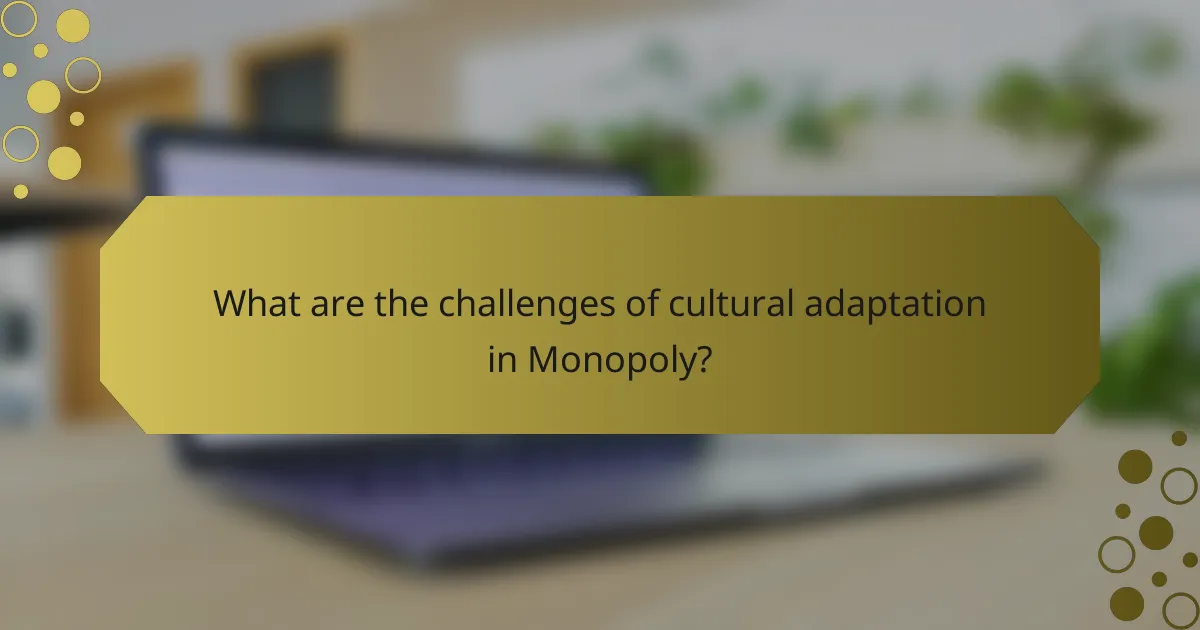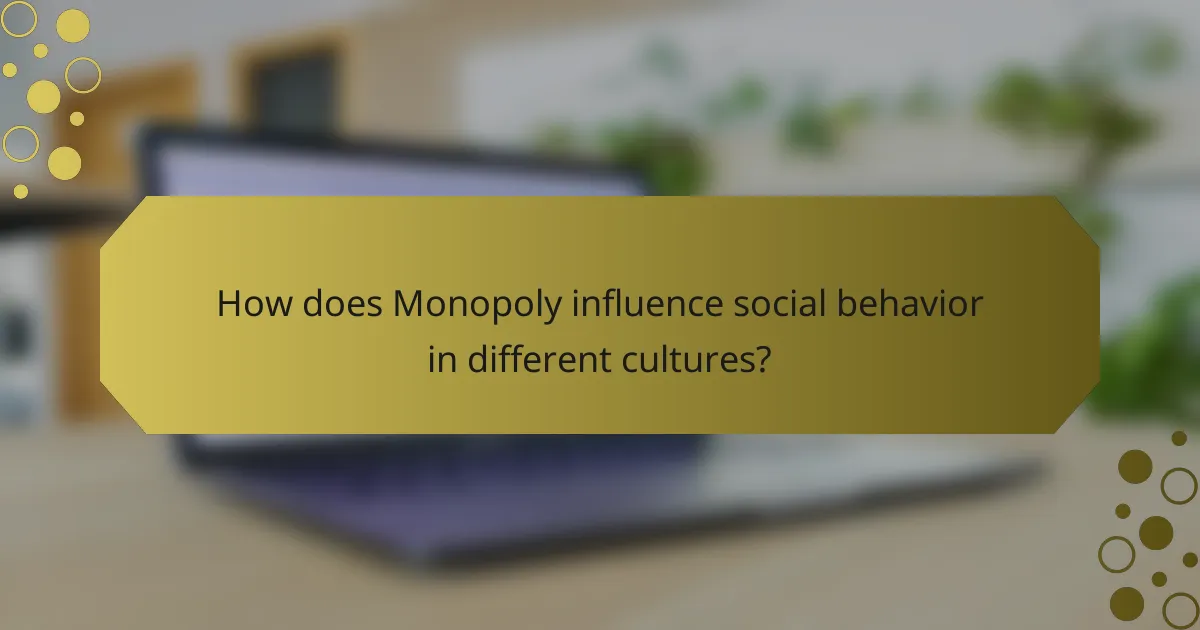Monopoly exemplifies the intersection of globalization and cultural adaptation by tailoring its gameplay to resonate with diverse audiences around the world. By creating localized versions that reflect regional values and preferences, the game fosters a deeper connection among players, enhancing their engagement. This cultural responsiveness not only influences local economies but also promotes global interaction through shared experiences and events.

How does Monopoly adapt to global markets?
Monopoly adapts to global markets by creating localized versions of the game that reflect cultural nuances and preferences. This ensures that players from different regions can connect with the game on a personal level, enhancing their overall experience.
Localized game editions
Localized game editions of Monopoly are tailored to specific countries or regions, featuring local landmarks, currency, and community chest cards that resonate with players. For example, the Monopoly version in the UK includes properties like Mayfair and Park Lane, while the US edition features Boardwalk and Park Place.
These editions often incorporate local languages and cultural themes, making the game more relatable. This approach not only boosts sales but also fosters a sense of pride among players who see their own communities represented.
Cultural references in gameplay
Monopoly incorporates cultural references in gameplay to enhance engagement. This can include themed editions based on popular movies, television shows, or historical events relevant to a particular region. For instance, a Monopoly edition based on a famous city might include local businesses and cultural icons.
These references help players connect with the game, making it more enjoyable and meaningful. By integrating familiar elements, the game becomes a reflection of the local culture, encouraging players to share their experiences with others.
Regional rule variations
Regional rule variations in Monopoly can significantly alter gameplay, adapting to local preferences and gaming styles. For example, some countries may have different rules regarding property trading or the handling of bankruptcy, which can change the game’s dynamics.
Players should be aware of these variations when playing with international friends or family. Familiarizing oneself with the specific rules of a localized edition can enhance the gaming experience and prevent misunderstandings during play.

What are the cultural impacts of Monopoly worldwide?
The cultural impacts of Monopoly worldwide are significant, as the game influences local economies and reflects societal values. Its adaptation in various countries showcases how cultural nuances shape gameplay and the overall experience.
Influence on local economies
Monopoly can stimulate local economies by promoting entrepreneurship and financial literacy. In many regions, localized versions of the game feature real businesses and landmarks, encouraging players to engage with their communities.
For example, in the United States, special editions highlight local businesses, which can increase foot traffic and awareness. This localized approach can lead to a boost in sales for those businesses featured in the game.
Reflection of societal values
The game of Monopoly often mirrors the societal values and economic structures of the cultures in which it is played. In some countries, the emphasis may be on competition and individual success, while in others, it may highlight community and cooperation.
In Japan, for instance, the game has been adapted to reflect the importance of harmony and group dynamics, altering traditional gameplay to encourage collaboration rather than cutthroat competition. Such adaptations reveal how cultural context shapes perceptions of wealth and success.

How does Monopoly promote globalization?
Monopoly promotes globalization by connecting players from different countries through shared gameplay experiences and international events. The game encourages cultural exchange and collaboration, making it a platform for global interaction.
International tournaments
International Monopoly tournaments bring together players from various nations to compete on a global stage. These events often feature regional qualifiers leading to a world championship, fostering a sense of community among participants.
For example, the Monopoly World Championship typically occurs every few years, attracting contestants from dozens of countries. Players must adapt their strategies to different cultural styles of play, enhancing the global appeal of the game.
Cross-border collaborations
Cross-border collaborations in Monopoly involve partnerships between game developers, local distributors, and cultural organizations. These collaborations help tailor the game to reflect local customs while maintaining its core identity.
For instance, special editions of Monopoly may be created to celebrate national landmarks or historical events, appealing to local markets while promoting the brand internationally. This approach not only boosts sales but also enriches the gaming experience for players worldwide.

What are the challenges of cultural adaptation in Monopoly?
Cultural adaptation in Monopoly involves modifying the game to resonate with different cultural contexts while maintaining its core essence. This process can be challenging due to varying traditions, values, and consumer preferences across regions.
Balancing tradition and innovation
Successfully adapting Monopoly requires a careful balance between preserving traditional gameplay and introducing innovative elements that appeal to local players. For instance, while the classic properties and game mechanics should remain intact, incorporating local landmarks or cultural references can enhance engagement.
Game developers must consider how much to alter the game without losing its identity. A common approach is to introduce themed editions that reflect local culture while keeping the original rules and structure, ensuring that both nostalgic and new players find value.
Market acceptance issues
Market acceptance can be a significant hurdle when adapting Monopoly for different cultures. Variations in consumer behavior, preferences, and even economic conditions can impact how well a localized version is received. For example, a game priced in local currency must align with the average spending power of the target audience.
To improve acceptance, developers should conduct market research to understand local tastes and preferences. Engaging with local influencers or conducting focus groups can provide insights into what features resonate best, helping to avoid common pitfalls such as cultural insensitivity or misrepresentation.

What role do local customs play in Monopoly versions?
Local customs significantly influence how Monopoly is adapted in different regions, ensuring the game resonates with players’ cultural contexts. These adaptations enhance player engagement by incorporating familiar elements that reflect local traditions and societal norms.
Incorporation of regional landmarks
Monopoly versions often feature local landmarks as property spaces, making the game more relatable. For instance, in a version set in Paris, players might buy properties like the Eiffel Tower or the Louvre, while a New York edition would include Times Square and Central Park.
This incorporation not only fosters a sense of community pride but also educates players about their local geography. When designing or selecting a version, consider how well the landmarks represent the area’s culture and history.
Adaptation of currency and property names
Currency and property names are crucial for making Monopoly relatable to local players. Different versions replace standard currency with local denominations, such as using Euros in European editions or Australian Dollars in Australian versions. This change helps players connect with the game’s financial aspects more intuitively.
Additionally, property names may be altered to reflect local businesses or neighborhoods, enhancing the game’s relevance. When choosing a version, look for one that uses familiar currency and property names to ensure a more immersive experience.

How does Monopoly influence social behavior in different cultures?
Monopoly influences social behavior by reflecting and shaping economic interactions within various cultures. It serves as a tool for understanding competition, wealth distribution, and social dynamics, which can differ significantly across cultural contexts.
Teaching economic principles
Monopoly effectively teaches fundamental economic principles such as supply and demand, property ownership, and investment strategies. Players learn about the consequences of financial decisions, including the risks of bankruptcy and the benefits of strategic trading.
In cultures with strong entrepreneurial values, players might emphasize aggressive investment and property acquisition, while in others, the focus may shift to negotiation and collaboration. This variation highlights how cultural attitudes towards money and competition can shape gameplay experiences.
Fostering competition and cooperation
The game fosters both competition and cooperation, as players must navigate alliances and rivalries to succeed. In some cultures, players may prioritize competitive strategies, aiming to dominate the board, while in others, cooperative tactics may emerge, with players forming temporary alliances to thwart a leading competitor.
Understanding these dynamics can enhance gameplay and social interaction. For instance, in cultures that value collectivism, players might engage in more cooperative strategies, sharing resources and negotiating trades that benefit multiple players rather than just one. This adaptability reflects the cultural nuances that influence how Monopoly is played and enjoyed.

What are the future trends for Monopoly in a globalized world?
The future of Monopoly in a globalized world is shaped by digital innovations, the rise of emerging markets, and the integration of technology into gameplay. These trends are transforming how players engage with the game, making it more accessible and relevant across diverse cultures.
Digital adaptations and online play
Digital adaptations of Monopoly are becoming increasingly popular, allowing players to enjoy the game online through various platforms. These adaptations often feature updated graphics, interactive elements, and the ability to play with friends or strangers worldwide, enhancing the social aspect of the game.
Online play also introduces flexible formats, such as quick matches or longer sessions, catering to different player preferences. Many digital versions offer customizable rules and themes, which can appeal to a broader audience and reflect local cultures.
Emerging markets and new editions
Emerging markets are driving the release of new Monopoly editions tailored to local tastes and customs. Countries like India, Brazil, and China are seeing versions that incorporate regional landmarks, currencies, and cultural references, making the game more relatable to local players.
These new editions not only expand the game’s reach but also encourage local engagement and interest in the Monopoly brand. Companies are increasingly recognizing the importance of cultural adaptation to capture diverse markets effectively.
Integration of technology in gameplay
The integration of technology into Monopoly gameplay is enhancing the overall experience. Features like augmented reality (AR) and mobile apps are being introduced, allowing players to interact with the game board in innovative ways. For example, players can use their smartphones to scan properties for additional information or unlock special features.
Moreover, technology can streamline gameplay by automating transactions and keeping track of player statistics, reducing disputes and enhancing the flow of the game. As technology continues to evolve, we can expect even more immersive and engaging Monopoly experiences in the future.
